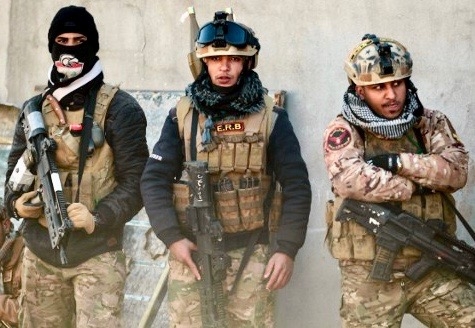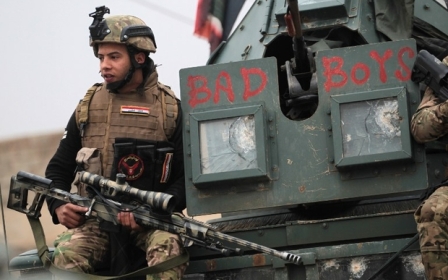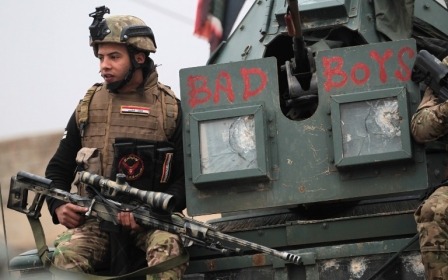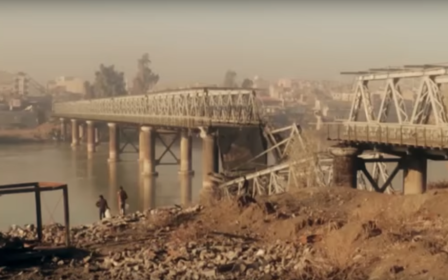Iraq says 60% of eastern Mosul has been captured from Islamic State

Iraqi forces have taken more than 60 percent of eastern Mosul from the Islamic State (IS) group since the battle for the city began in mid-October, a top commander said on Sunday.
"From east Mosul... more than 60 percent" has been recaptured from IS, Staff Lieutenant General Abdulwahab al-Saadi, a top commander in Iraq's Counter-Terrorism Service (CTS), told AFP.
He was speaking in an area southeast of Mosul, the city where IS proclaimed a cross-border "caliphate" in June 2014 after overrunning it and swathes of other Iraqi territory.
The eastern side of Mosul, which is split by the Tigris River, is the larger of the two, but more civilians live in the west, he said.
Saadi said IS has reinforced east Mosul, where the fighting has been concentrated so far, even using a crane to lift explosives-rigged vehicles across a destroyed bridge. "The crane was struck," he said.
Iraq's elite CTS forces are highly trained, well equipped and have spearheaded battle after battle against IS, but the going has been tough since Prime Minister Haider al-Abadi announced the beginning of the operation to retake Mosul on 17 October last year.
Hundreds of thousands of civilians remain inside Iraq's second city, a large urban area that gives IS myriad opportunities for ambushes, forcing Iraqi and allied forces to take precautions and slowing their advance.
CTS and other forces more recently deployed inside the city have been moving house-to-house, dodging sniper fire, suicide car bombs and booby traps to retake one neighbourhood after another.
CTS linked up with members of the Rapid Response Division, another elite Iraqi unit, on the border of the adjoining al-Intisar and al-Quds areas in eastern Mosul on Saturday, and a senior officer said the forces would form a joint front to advance.
Iraqi forces have yet to enter west Mosul, which is still completely held by IS.
IS overran large areas north and west of Baghdad in 2014, but Iraqi forces have since regained much of the territory they lost to the militants.
Mosul is now the last Iraqi city where IS holds significant territory, but the militants also still control parts of western Anbar province, and are able to mount frequent attacks in government-held areas, especially Baghdad.
On Thursday, Iraqi forces announced the "second phase" of the battle for eastern Mosul, marking the start of a new round of intensive fighting after progress had previously slowed to a crawl.
Abadi had pledged that the city would be retaken by the end of 2016, a goal that was not realised.
He more recently said that the country would need three months to eliminate IS - still an ambitious timeline given that it would mean retaking Mosul, clearing the militants out of Anbar and eliminating sleeper cells in government-controlled areas.
Artillery strike
An artillery strike by the US-led coalition in Mosul struck a mortar position next to two empty school buildings that IS had been using to target Iraqi security forces, the US military said on Sunday.
No civilians were in the area and minimal damage was reported to the buildings, the Combined Joint Strike Force said in a statement. Schools, like hospitals and mosques, are protected under international law.
"While the Coalition takes extraordinary effort to protect civilians and strike appropriate military targets, we will continue to strike ISIL wherever and whenever our partner's lives are in danger in accordance with the Law of Armed Conflict," it said, using another acronym for Islamic State.
New MEE newsletter: Jerusalem Dispatch
Sign up to get the latest insights and analysis on Israel-Palestine, alongside Turkey Unpacked and other MEE newsletters
Middle East Eye delivers independent and unrivalled coverage and analysis of the Middle East, North Africa and beyond. To learn more about republishing this content and the associated fees, please fill out this form. More about MEE can be found here.




